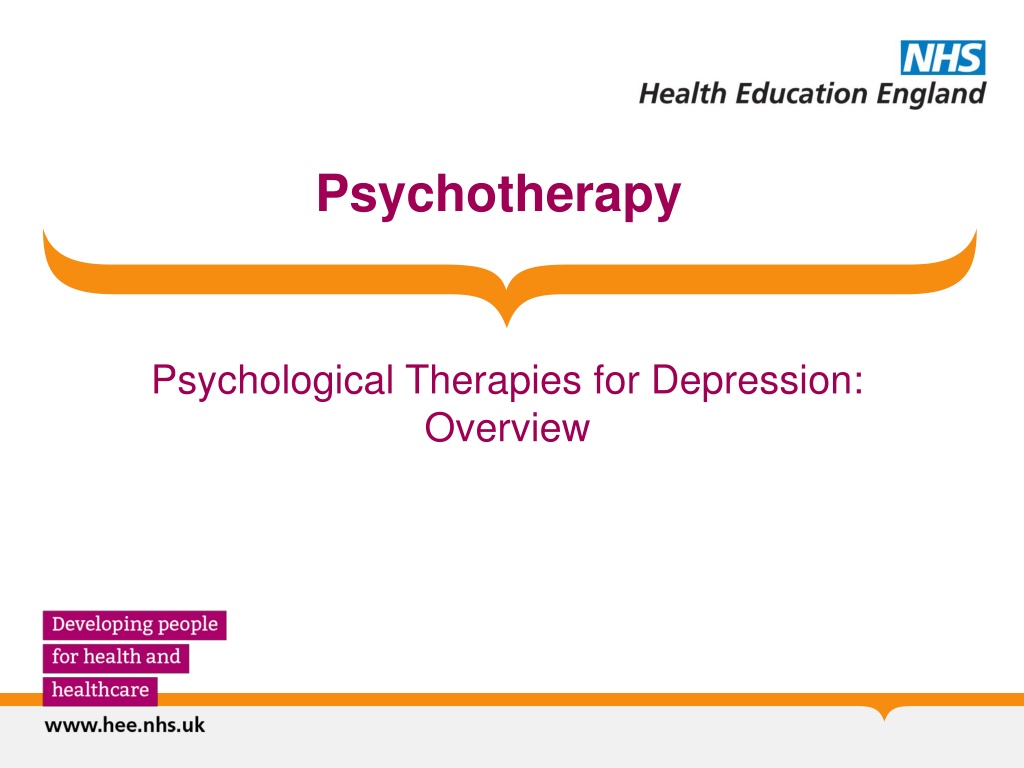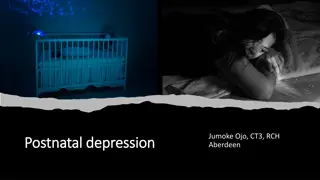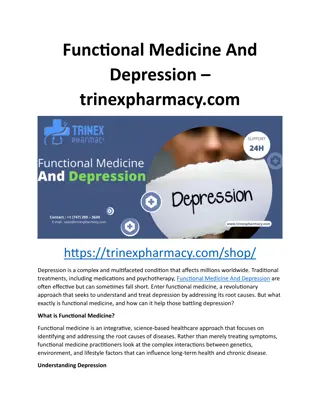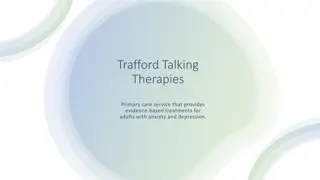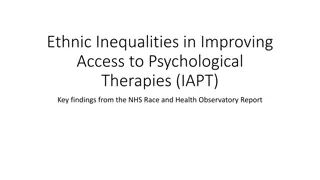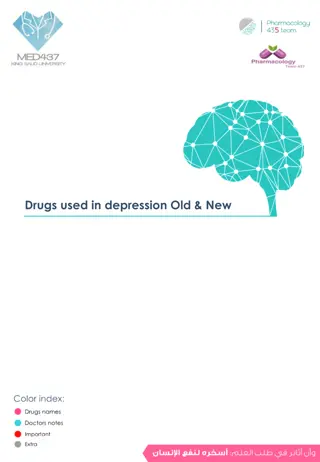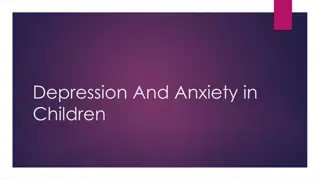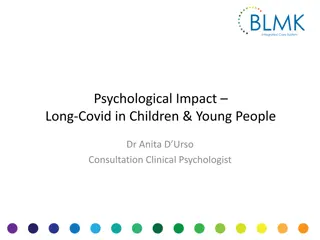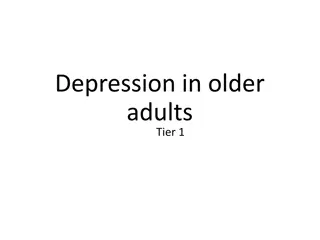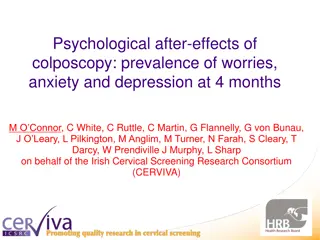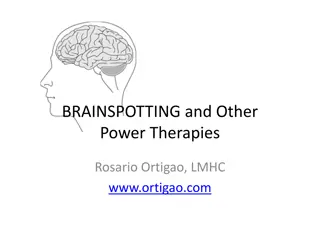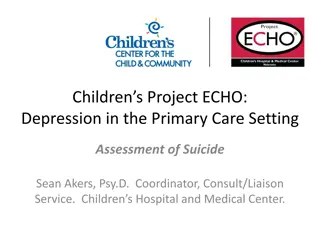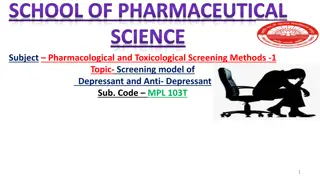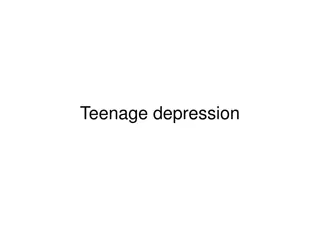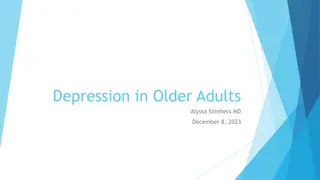Understanding Psychological Therapies for Depression
Explore the core psychological symptoms of depression, major models for formulating depression, key aetiological factors, and evidence-based treatments. Delve into negative thoughts about self, world, and future in depression, as well as the cognitive model that underlies how thoughts influence feelings, behaviors, and perceptions. Learn from expert-led sessions and case presentations to increase awareness and knowledge of psychological aspects of depressive disorder.
Uploaded on Sep 30, 2024 | 0 Views
Download Presentation

Please find below an Image/Link to download the presentation.
The content on the website is provided AS IS for your information and personal use only. It may not be sold, licensed, or shared on other websites without obtaining consent from the author. Download presentation by click this link. If you encounter any issues during the download, it is possible that the publisher has removed the file from their server.
E N D
Presentation Transcript
Psychotherapy Psychological Therapies for Depression: Overview
Psychological Therapies for Depression: Overview Aims and Objectives (from handbook) To increase awareness of the psychological aspects of Depressive Disorder. To have an introductory knowledge of the main psychological models for depression. To have an overview of psychological treatments for Depression
Psychological Therapies for Depression: Overview To achieve this Case Presentation Journal Club 555 Presentation Expert-Led Session MCQs Please sign the register and complete the feedback
Psychological Therapies for Depression: Overview Expert Led Session Psychological Therapies for Depression: Overview Author: Dr. Adam Dierckx Consultant Medical Psychotherapist
What we will cover Core psychological symptoms of depression Major models for formulating depression Key aetiological factors Treatment and evidence base
Depression: Psychological Symptoms Negative thoughts about: Self World Future
Self Worthless Guilty Persecuted Self-contempt Unwell Undeserving
World Uninteresting / boring Corrupt Hostile Unchangeable Against me Dangerous
Future Negative / pessimistic Hopeless Unchangeable Impending catastrophe Better without me Suicidal
Cognitive Model Thoughts determine feelings Thoughts are determined and reinforced by perceptions Internal sensations External events (Mis-)interpreted
Cognitive Model Sensations Thoughts Feelings Behaviours
Cognitive Model Thoughts are the most amenable to therapy Thoughts can be distorted in characteristic ways Automatic Negative Cognitive Distortions
Cognitive Distortions Disqualifying the positive Catastrophizing Over-generalization Personalization Selective attention Bias
Cognitive Schema Set of rules / generalizations to make sense of new situation quickly Helpful most of time Formed from previous experiences Can prevent new learning
Psychoanalytic Model of the Mind Conscious Preconscious Unconscious
Defences Defences are: Mental procedures that are designed to bring about a reduction in anxiety. Normal / universal. Can lead to symptoms & compromises.
Defences & Topographic model Transformed content Painful affect Conscious Defences Defences Unconscious
Primitive Defences Reduce awareness Denial Dissociation Repression Isolation Intellectualisation Rationalisation Create symptoms Idealisation Denigration Displacement Introjection Projection / PI Reaction formation Conversion Sublimation Humour
Conflict Defensiveness degree of conflict Role of loss Introjection of conflictual / hateful part of relationship Freud: Mourning & Melancholia (1914)
Mental phenomena Transference Earlier feelings are transferred from their original object (typically a parent) to a current relationship, in therapy the therapist/analyst. Unconscious
Transference: relationship templates Early Relationships Current Relationships Relation to therapist
Counter-transference Feelings you get that result from the influence the patient has on you. Can be related to own difficulties Can also be part of non-verbal communication Can use diagnostically (with caution)
Behavioural Model Different behaviours lead to emotional responses Feeling low encourages certain behaviours Coping strategies Consequences of affect state These behaviours reinforce mood state Therapy seeks to change mood by acting differently Reduce active mood harming behaviours e.g. drinking Increase neglected helpful behaviours e.g. exercise
Systemic Model No man is an island, Entire of itself. Each is a piece of the continent, A part of the main. If a clod be washed away by the sea, Europe is the less. As well as if a promontory were. As well as if a manor of thine own Or of thine friend's were. Each man's death diminishes me, For I am involved in mankind. Therefore, send not to know For whom the bell tolls, It tolls for thee. John Donne (1624)
Systemic Model Mother Family System Father Son Daughter
Systemic Model Patient Care team Work Clinical System Family Friends
Aetiology of Depression Biological Psychological The other two become psychological due to being experienced by the patient Social
Aetiology of Depression Family History, Temperament & Vulnerability Early relationships Events e.g. loss Character / quality of relationships Attachment Life events Social factors Psychological triggers Losses Meaning of those losses
Psychological Treatment Cognitive therapy / CBT Psychodynamic therapy Systemic interventions
Evidence Base CBT, RCTs & NICE The standard EBM model Other therapies, other trials and guidance Problems with the EBM model Real life practice
Evidence for Psychotherapy Falk Leichsenring E.g. Effectiveness of LTPP JAMA (2008) 300(13):1551-1565 E.g. Effectiveness of STPP Arch Gen Psychiatry (2004) 61:1208-1216
Summary Core psychological symptoms of depression Major models for formulating depression Key aetiological factors Treatment and evidence base
Psychological Therapies for Depression: Overview MCQs 1. NICE guidance (CG90): A. Recommends Computerised CBT for mild-moderate depression B. Recommends Psychotherapy for severe depression C. Advises not combining medication with psychological therapies D. Recommends Cognitive therapy for relapse prevention E. Defines Short-term Psychodynamic Psychotherapy as 10-15 sessions over 3-4 months
Psychological Therapies for Depression: Overview MCQs 1. NICE guidance (CG90): A. Recommends Computerised CBT for mild-moderate depression B. Recommends Psychotherapy for severe depression C. Advises not combining medication with psychological therapies D. Recommends Cognitive therapy for relapse prevention E. Defines Short-term Psychodynamic Psychotherapy as 10- 15 sessions over 3-4 months
Psychological Therapies for Depression: Overview MCQs 2. Cognitive Therapy: A. Is originally based on the work of Judith Beck B. Identifies Cognitive Errors that lead to or maintain depressive thoughts C. Focuses on non-conscious thought content D. Is enhanced by concurrent antidepressant treatment E. Should not be used in older patients
Psychological Therapies for Depression: Overview MCQs 2. Cognitive Therapy: A. Is originally based on the work of Judith Beck B. Identifies Cognitive Errors that lead to or maintain depressive thoughts C. Focuses on non-conscious thought content D. Is enhanced by concurrent antidepressant treatment E. Should not be used in older patients
Psychological Therapies for Depression: Overview MCQs 3. Psychodynamic Therapies: A. Have no evidence base for effectiveness B. Are based on the model of the mind put forward by Freud C. Seek to eradicate a patient s defences D. Were among the first to link depression to loss E. Focus on the past
Psychological Therapies for Depression: Overview MCQs 3. Psychodynamic Therapies: A. Have no evidence base for effectiveness B. Are based on the model of the mind put forward by Freud C. Seek to eradicate a patient s defences D. Were among the first to link depression to loss E. Focus on the past
Psychological Therapies for Depression: Overview MCQs 4. Psychological factors in the aetiology of depression include A. Parental indifference B. Social circumstance C. Maternal Depression D. Cognitive biases or distortions E. Bereavement
Psychological Therapies for Depression: Overview MCQs 4. Psychological factors in the aetiology of depression include A. Parental indifference B. Social circumstance C. Maternal Depression D. Cognitive biases or distortions E. Bereavement
Psychological Therapies for Depression: Overview MCQs 5. Evidence of effectiveness in the treatment of depression exists for: A. Psychoanalytic therapy B. Interpersonal Therapy C. Low intensity therapy in IAPT D. Mentalization based CBT E. EMDR
Psychological Therapies for Depression: Overview MCQs 5. Evidence of effectiveness in the treatment of depression exists for: A. Psychoanalytic therapy B. Interpersonal Therapy C. Low intensity therapy in IAPT D. Mentalization based CBT E. EMDR
Psychological Therapies for Depression: Overview Any Questions? Thank you.
